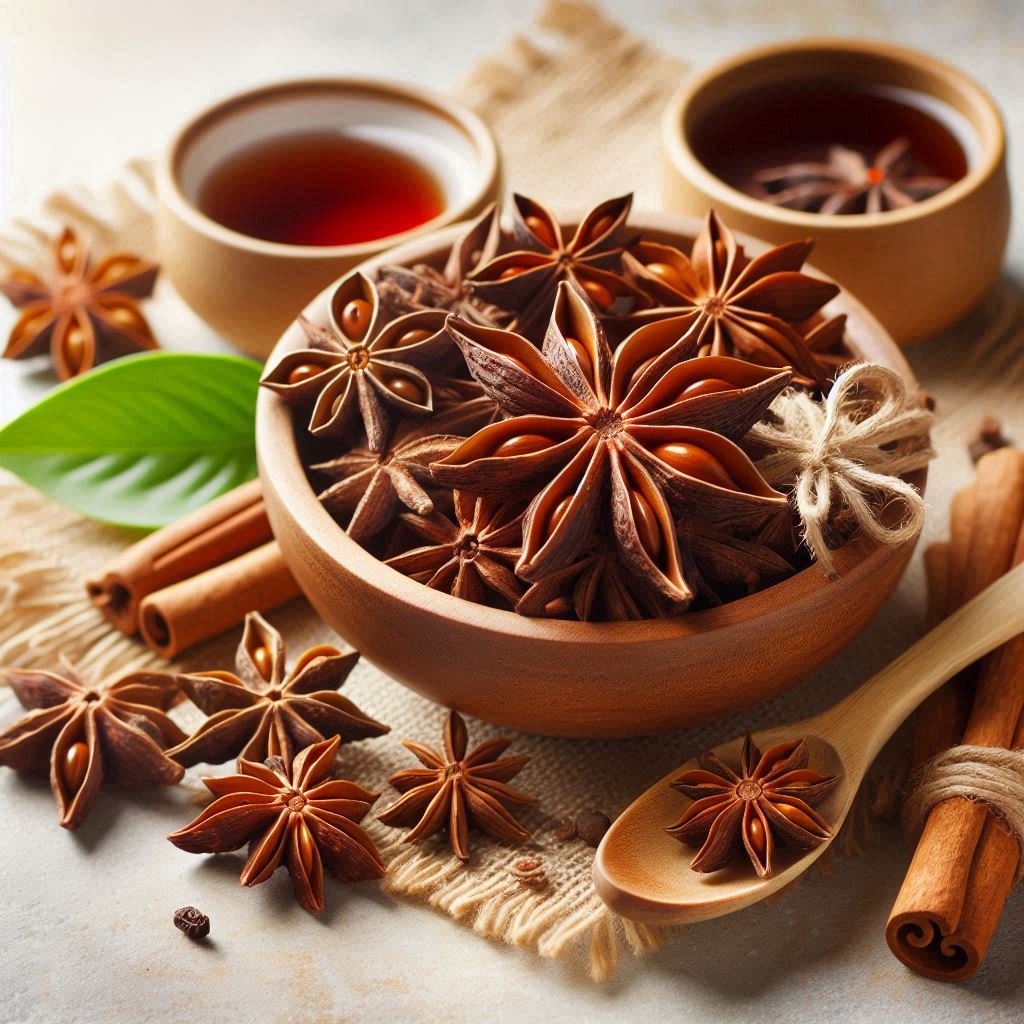Star anise: benefits, uses and potential risks explored

Star anise, a spice that hails from the star-shaped pericarp of Illicium verum, brings a touch of the exotic to dishes and remedies worldwide. Its distinct flavor, likened to licorice, has made it a staple in culinary arts, especially within Chinese cuisine, while its potent medicinal properties have secured a place for it in traditional healing practices.
- What Are the Health Benefits of Star Anise?
- How Do You Use Star Anise In Cooking?
- What Are the Side Effects of Star Anise?
- Is Star Anise Safe During Pregnancy?
- What Is the Role of Star Anise in Traditional Medicine?
- How Can Star Anise Be Beneficial for Weight Loss?
- What Precautions Should Be Taken When Using Star Anise?
- Frequently Asked Questions About Star Anise
What Are the Health Benefits of Star Anise?
As a repository of shikimic acid, which is instrumental in the production of Tamiflu, star anise is often celebrated for its antiviral properties. This, however, is just the tip of the iceberg when it comes to the health advantages of star anise. This spice is also a powerhouse of antioxidants, which play a vital role in safeguarding the body from harmful free radicals.
Furthermore, star anise is known for its antifungal and antibacterial properties, making it a formidable foe against pathogenic strains like E. coli. People often turn to this spice for relief from digestive issues, leveraging its carminative effects to soothe an upset stomach, reduce bloating, and alleviate gas.
But the benefits extend beyond the digestive system. Star anise has been associated with improved skin health and is believed to contribute to a more robust immune system. Its impact on blood sugar regulation is another area of interest, though more research is needed to fully understand this effect.
How Do You Use Star Anise In Cooking?
The culinary uses of star anise are diverse and exciting, with its presence felt across various cuisines. In cooking, it's often incorporated into meat dishes, soups, and broths, imparting a warmth and depth of flavor that is uniquely its own.
- Star anise can be used whole or ground, though the whole pods allow for easier removal after cooking.
- It's a critical component of the Chinese five-spice powder, where it contributes its pungent sweetness.
- For a twist, it can be infused into syrups or used to flavor baked goods and desserts.
When using star anise, it's essential to balance its strong flavor with other ingredients to avoid overwhelming dishes. A single pod can enhance the taste profile of an entire meal.
What Are the Side Effects of Star Anise?
While the therapeutic properties of star anise are noteworthy, it's also important to consider its potential risks and precautions. The spice is generally safe when consumed in culinary amounts, but it's important to distinguish between Chinese star anise and Japanese star anise – the latter being toxic and not suitable for consumption.
Excessive consumption of star anise, particularly in its oil form, can lead to star anise poisoning symptoms such as nausea, vomiting, and seizures. Individuals with allergies to the spice should obviously avoid it, and it's wise for everyone to stay vigilant for any adverse reactions.

Is Star Anise Safe During Pregnancy?
Pregnancy often brings with it a heightened sense of caution about food and medicinal intake. In the case of star anise, pregnant women are typically advised to consume it in moderation. The potential influence of star anise on fertility and pregnancy is a subject of ongoing study, but erring on the side of caution is prudent.
Moreover, since star anise has been used traditionally to promote lactation, some believe it could be beneficial post-pregnancy. However, due to the lack of robust evidence and the risk of contamination with toxic species, medical professionals generally recommend limiting its use during this time.
What Is the Role of Star Anise in Traditional Medicine?
In Ayurveda and Chinese medicine, star anise has carved out a significant role for itself. These traditional health systems utilize the spice for its expectorant properties, helping to clear congestion in the respiratory tract.
Star anise also finds its place in the treatment of rheumatism and to improve digestion. Its soothing effects on the stomach are particularly appreciated in these ancient practices, often being prescribed as a remedy for colic and indigestion.
Historically, its sedative properties have been employed to promote better sleep, and some cultures use it as an aphrodisiac, though scientific evidence for these uses is less concrete.
How Can Star Anise Be Beneficial for Weight Loss?
When it comes to weight management, star anise is often mentioned for its potential to boost metabolism. Its diuretic properties may help in the elimination of waste and excess water from the body, contributing to weight loss efforts.
Furthermore, the spice's digestive benefits suggest that it could enhance the body's ability to absorb nutrients more effectively and improve gut health, which is sometimes linked to healthy weight maintenance.

However, it's worth noting that while star anise might offer support, it should not be seen as a standalone solution for weight loss. A balanced diet and regular exercise remain the cornerstones of effective weight management.
What Precautions Should Be Taken When Using Star Anise?
As with any potent botanical, certain precautions should be taken when using star anise. Ensuring that the spice is sourced from reputable suppliers is critical to avoid the risk of contamination with the toxic Japanese star anise.
Individuals with a history of hormone-sensitive conditions should consult a healthcare provider before using star anise, given its possible estrogenic effects. And as always, moderation is key; excessive consumption can lead to adverse reactions.
Awareness of the source and quantity of star anise consumed is vital, especially when it comes to using it in therapeutic contexts.
Frequently Asked Questions About Star Anise
Does Star Anise Have Negative Side Effects?
While star anise is celebrated for its medicinal benefits, there are instances where it can lead to negative side effects. This usually occurs when consumed in large quantities or when the toxic Japanese variety is ingested mistakenly. Symptoms can include jitteriness, rapid heartbeat, and convulsions.
For most people, star anise is safe when used in food as a spice. However, those with specific health conditions or pregnant women should seek medical advice before incorporating it into their diet or health regimen.
What Does Star Anise Do to Your Body?
Star anise can have several positive impacts on the body, thanks to its rich composition of compounds with antioxidant, anti-microbial, and anti-inflammatory properties. It may help with digestive health, immune support, and potentially even blood sugar regulation.

However, it's important to remember that the effects can vary depending on the individual, so it's always best to use star anise in moderation and be aware of personal sensitivities.
What Is Star Anise Most Commonly Used for?
Star anise is most commonly used as a flavor enhancer in cooking, particularly in Asian cuisine. It's also a component of the traditional five-spice powder. Beyond culinary use, it is utilized for its therapeutic properties in traditional medicine systems like Chinese and Ayurvedic medicine.
Is Anise Good for the Kidneys?
There's some evidence to suggest star anise may have diuretic properties, which could be beneficial for kidney function, helping the body to eliminate excess salt and water. Nonetheless, those with kidney issues should consult a healthcare provider before using it as a remedy.
In summary, star anise is a multifaceted spice with a wealth of benefits ranging from culinary delight to medicinal relief. Yet it's not without its risks, and recognizing the difference between Chinese and Japanese star anise is paramount. When sourced responsibly and used with care, star anise can be an enriching addition to both diet and health practices.

Leave a Reply